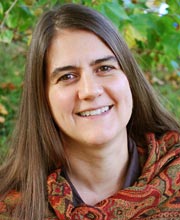
A University of Reading-led project to help people in Mozambique ‘green’ their urban neighbourhood and make it more resilient to climate change has won a United Nations award!
The project in Maputo, Mozambique, co-led by Dr Emily Boyd, from our Geography Department, has been announced (6 November 2013) among 17 inspiring projects as 2013 Lighthouse Activities under the Momentum for Change initiative of the United Nations.
Climate change is increasingly having an effect on communities across the globe, but its effects in poor urban areas in Africa are often particularly extreme. Increasing risk of coastal flooding, heat waves and extreme rainfall could put the safety and livelihood of millions of people at risk.
The project’s aim was to help the community have more of a say in government and business plans for urban development. Since being implemented, local people have started a new community recycling centre, cutting down on litter, helped clean and maintain drainage channels to prevent potential flooding problems, and now have a stronger voice in urban planning and development decisions.
Dr Boyd said: “An exciting finding from this work is the evidence that local residents, including relatively uneducated citizens, both want and are capable of handling information about the climate, when it relates to their own experiences of problems such as flooding.
“By getting active involvement of people, literally at street level, we have shown the importance of helping people to speak up about the problems they are facing from a changing climate. This helps to compel government institutions and businesses to take action. By empowering individuals and showing them the important role they play, we have seen an effective way to motivate people to help change their communities for the better.”
The project was jointly undertaken between academics from British and Finnish institutions, with involvement from the University of Reading, University College London, University of York, FUNAB and Aalto University.
Lighthouse Activities and the Momentum for Change initiative are spearheaded by the UN Climate Change secretariat, to shine a light on the groundswell of activities underway across the globe towards a low-carbon, resource-efficient world.
UNFCCC Executive Secretary Christiana Figueres said: “The 2013 Lighthouse Activities are true beacons of hope, demonstrating what happens when innovation and passion come together to address the biggest challenge of our time.
“There are thousands of examples of people taking action to address climate change all over the world. The Lighthouse Activities highlight some of the most practical, scalable and replicable examples of what people, businesses, governments and industries are doing to tackle climate change, which I hope will inspire others to do the same.”
For more information, please contact Sarah Marchildon, Communications Officer, United Nations Climate Change Secretariat, at smarchildon@unfccc.int or +49 228 815 1065.
For media information from the University of Reading, please contact Pete Castle, University of Reading press office, at p.castle@reading.ac.uk or +44 (0)118 378 7391.
Visit unfccc.int or momentum4change.org
Momentum for Change on Facebook
Momentum for Change on Twitter
The 2013 Lighthouse Activities were selected by a 16-member, international advisory panel as part of the secretariat’s Momentum for Change initiative, which is funded by the Bill & Melinda Gates Foundation and the Rockefeller Foundation, and operates in partnership with the World Economic Forum.
The 17 activities will be showcased at special events during the UN Climate Change Conference in Warsaw, Poland (11-22 November).
Interested stakeholders can interact with the activity representatives during two social media discussions ahead of the climate conference. A Twitter chat took place on 6 November from 16:00 to 16:30 (CET).
Participants can comment using the hashtag #m4c. A Google Hangout will take place on 13 November.

 Professor Dominik Fleitmann conducting his research on speleothems
Professor Dominik Fleitmann conducting his research on speleothems
